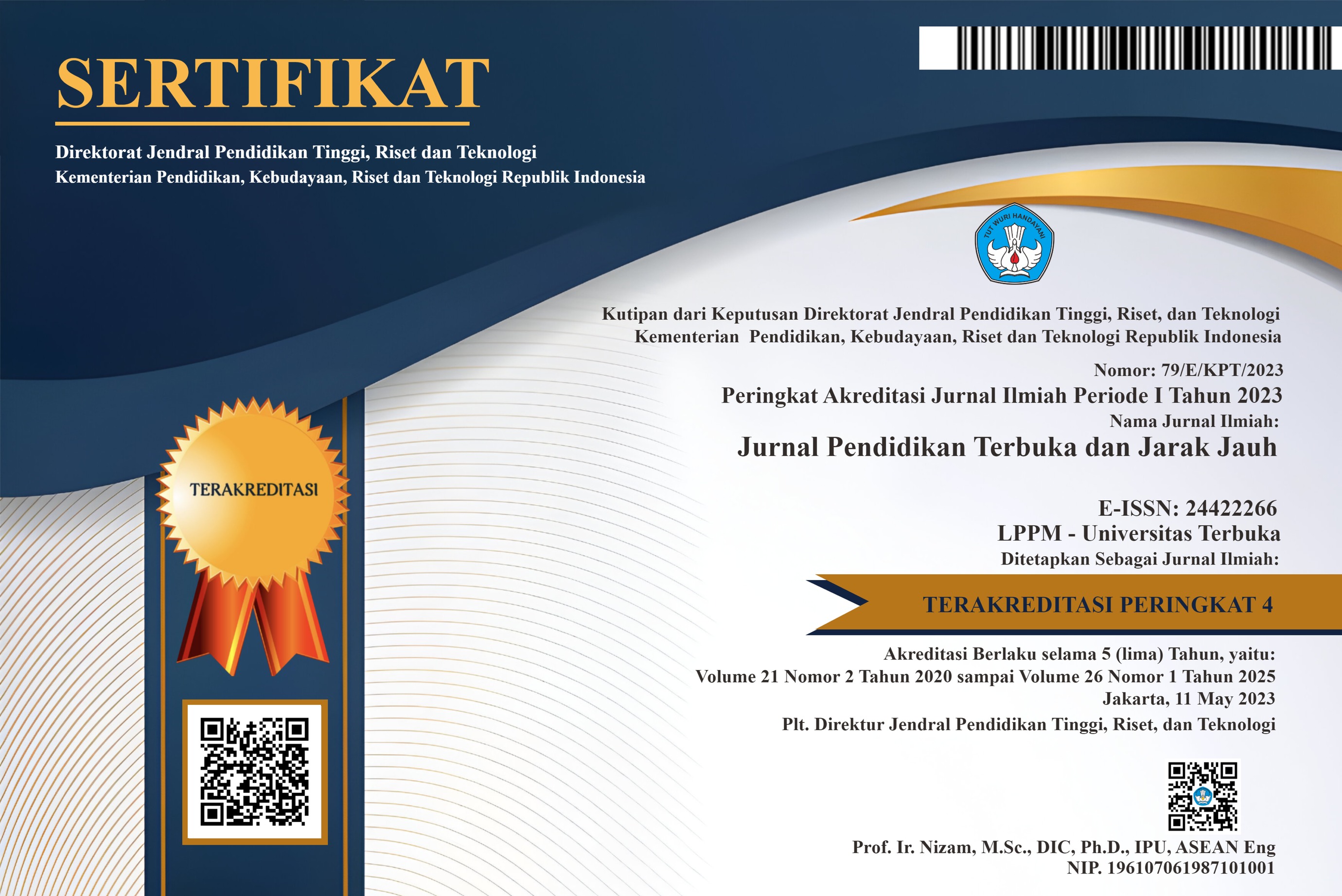KUALITAS PELAKSANAAN TUTORIAL TATAP MUKA S-1 PENDAS DI UPBJJ-UT PANGKALPINANG
Keywords:
Evaluasi Tutorial Tatap Muka (TTM), Evaluation of Face-to-Face Tutorial, PGSD Undergraduate Degree, S-1 PGSDAbstract
This article is a descriptive study that describes the quality of face-to-face tutorials in undergraduate studies at UPBJJ Pangkalpinang during the registration period of 2011.2. The method used in this study is a survey using a questionnaire. The population of the study consists of all tutors and undergraduate students that conduct face-to-face tutorials in all study groups throughout UPBJJ-UT Pangkalpinang region during the registration period of 2011.2. Samples were taken with a purposive random sampling. The aim of this study is focused on the implementation of the tutorial for undergraduate students. The study will also discuss a few other aspects: (a). Students profile (b). Tutors: knowledge and skills of tutors, and tutors commitment in implementing the tutorial. (c). Teaching materials and supplies. (d). Tutorial location and facilities. The results of this experiment are: (1) Students attendance and participation in tutorial activities are good enough, as seen during the tutorial almost all the students are present and active. Most students wish there is a face-to-face tutorial conducted for all offered courses. (2). Tutorial implementation run well according to the schedules. The tutorial provided good support to students in their learning process at UT and these activities can eliminate the perception that learning at UT is only needed when the final exams approach. (3). Tutors capability in implementing face-to-face tutorials in undergraduate studies within the 2011.2 PGSD registration period is categorized as good, partly because the S-1 PGSD tutors had received training and capacity building before carrying out the tutorial. (4). The District Education Office takes a solid role in organizing tutorials, including provision of tutorial venues (usually done in school buildings), provision of accommodation for students who live remotely from the tutorial venue, and keeping students informed on tutorial schedules and venues.
Artikel ini adalah penelitian deskriptif yang menggambarkan kualitas TTM S-1 Pendas di UPBJJ-UT Pangkalpinang pada masa registrasi 2011.2. Metode yang digunakan dalam penelitian ini adalah survei dengan menggunakan angket dan observasi. Populasi dalam penelitian ini seluruh tutor dan mahasiswa program S-1 Pendas yang melaksanakan kegiatan TTM di seluruh pokjar yang ada di wilayah UPBJJ-UT Pangkalpinang masa registrasi 2011.2. Sampel diambil dengan purposive random sampling. Tujuan penelitian ini difokuskan pada pelaksanaan tutorial bagi mahasiswa program S-1 Pendas. Selain itu dibahas pula berbagai aspek antara lain: (a). Profil mahasiswa (b). Tutor: pengetahuan dan keterampilan tutor dan komitmen tutor dalam melaksanakan tutorial. (c). Bahan Ajar dan bahan pendukung. (d). Tempat dan fasilitas kegiatan tutorial. Hasil penelitian ini adalah: (1) Pada kegiatan tutorial, kehadiran dan peran serta mahasiswa cukup baik, hal ini terlihat pada saat tutorial berlangsung hampir semua mahasiswa hadir dan aktif. Sebahagian besar mahasiswa menginginkan agar semua matakuliah yang ditawarkan dilaksanakan tutorial tatap muka. (2). Pelaksanaan tutorial pada prinsipnya berjalan dengan baik sesuai dengan jadwal yang telah ditentukan. Pelaksanaan Tutorial sangat membantu mahasiswa dalam proses pembelajaran di UT dan kegiatan ini dapat menghilangkan kesan bahwa kuliah di UT hanya cukup belajar menjelang UAS saja. (3). Kemampuan para Tutor dalam pelaksanaan TTM S-1 PGSD masa registrasi 2011.2 termasuk kategori baik, antara lain karena para tutor S-1 PGSD telah mengikuti pelatihan dan pembekalan tutor sebelum melaksanakan tutorial. (4). Peran Dinas Pendidikan Kabupaten/Kota sangat baik dalam penyelenggaraan tutorial, antara lain dengan menyediakan tempat tutorial (biasanya dilakukan di gedung-gedung sekolah), menyediakan tempat tinggal bagi mahasiswa yang rumahnya jauh dari tempat tutorial serta menginformasikan kepada mahasiswa tentang waktu dan tempat pelaksanaan tutorial.
References
Irawan. (2003). Logika dan prosedur penelitian. STIA LAN: Press.
Motik, I.S.D. (1989). A case study of the tutorial program at the Jakarta Regional Office of the Universitas Terbuka (The Indonesia Open University). Syracuse: Syracuse University.
Murlita, P.W. (1995). The effectiveness of tutorial service at Universitas Terbuka. Tesis Master yang tidak dipublikasikan. Canada: University of Victoria.
Ridwan, (2007). Metode dan teknik menyusun tesis. Bandung: Alfabeta.
Simonson, M., Smaldino, Sh., Albrigth, M., & Zvacek, S. (2012). Teaching and learning at a distance. (5th ed.). Boston: Pearson Education. Inc.
Suryosubroto, B. (1983). Sistem pengajaran dengan modul. Jakarta: Bina Aksara
Thorpe, et.al. (1986). The human dimension in the open university study. Open Learning
Tim Universitas Terbuka (2013). Katalog Universitas Terbuka 2013 FEKON, FISIP, FMIPA, FKIP Non Pendas. Jakarta: Penerbit UT
Tim Universitas Terbuka, (1999). Model-model tutorial. Bahan Ajar program akreditasi tutor UT (PAT-UT). Jakarta: PAU-PPAI UT.





